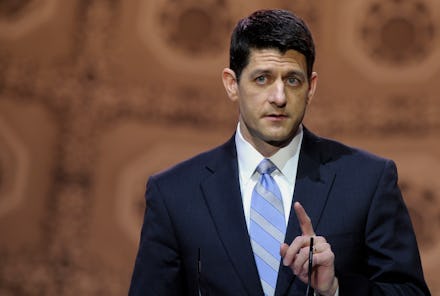Paul Ryan's Racist Comments Are a Slap in the Face to 10.5 Million Americans

The news: The art of blaming poor people for their poverty is certainly nothing new. It has a long history that's often rooted in racism and the convenient denial of facts. This is especially true in the United States, where politicians have used this method to avoid responsibility for the problems they've helped create. In the latest example, here's House Budget Chairman — and frequent "hey girl" meme fixture — Paul Ryan (R-Wisc.):
In case you missed that, here's the highlight reel: "We have got this tailspin of culture in our inner cities in particular of men not working, and just generations of men not even thinking about working, and not learning the value and the culture of work. So there's a real culture problem here that has to be dealt with."
Context: This quote is from Ryan's Wednesday appearance on Bill Bennett's Morning in America radio show, where he previewed his upcoming proposals to reform America's poverty programs. As you'd imagine, Ryan's received considerable backlash for this. Rep. Barbara D. Lee (D-Calif.) of the Congressional Black Caucus had some especially choice words:
"My colleague Congressman Ryan's comments about 'inner city' poverty are a thinly veiled racial attack and cannot be tolerated," she said in a statement. "Let's be clear, when Mr. Ryan says 'inner city,' when he says, 'culture,' these are simply code words for what he really means: 'black.'
"As someone who sits on the Budget Committee with Mr. Ryan, I know that his assertions about the racial dynamics of poverty are not only statistically inaccurate, but deeply offensive.
"Instead of demonizing 'culture,' and blaming black men for their poverty, Mr. Ryan should step up and produce some legitimate proposals on how to tackle poverty and racial discrimination in America. His uninformed policy proposals continue to increase poverty, not solve it. My colleague is demonstrating a complete lack of knowledge and understanding of the issues in urban and black communities."
Boom. Ryan has since gone on to deny that race has anything to do with what he said: "This has nothing to do whatsoever with race," he told the blog Crew of 42. "It never even occurred to me. This has nothing to do with race whatsoever."
But the sources he used to support his original comments tell a different story. For one, Charles Murray, who Ryan cited as having "written books" on the topic, is co-author of The Bell Curve, a book that famously attributed racial "achievement gaps" to the genetic intellectual inferiority of blacks and Latinos. If that "has nothing to do with race," I don't know what does.
Ryan's comments also conveniently ignore the deliberate politics that created and maintain inner city poverty. Racial segregation and discriminatory housing practices throughout the 20th century confined minorities — like black Americans — to specific geographic areas. Next, the crippling erosion of job opportunities, social services and systemic underfunding of public schools in these areas fostered the necessity for alternative and underground economies, like the drug trade, for people to survive. Then came the War on Drugs, which has disproportionately criminalized people of color, imprisoned them and confined them to perpetual second-class citizenship by refusing to give them jobs or let them vote. And Ryan has the nerve to say these people are "not even thinking about working"?
Get it together, Paul. These are just a few factors at play, all of which are casually dismissed here as part of a "cultural" problem. What's more, studies have found that poor people may actually work harder than their wealthier counterparts. Since politicians like Ryan are largely responsible for failing to prevent the economic meltdown that caused 2.6 million people to lose their jobs in 2008, perhaps he should reconsider his ignorant position and turn toward the real problems.
With 10.5 million Americans remaining jobless today, the "cultural problem" probably has more to do with social and economic policies than the perceived "laziness" of poor people.